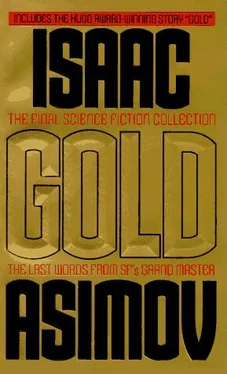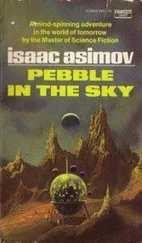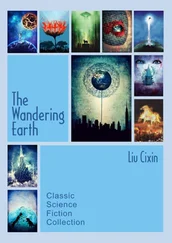Isaac Asimov - Gold - The Final Science Fiction Collection
Здесь есть возможность читать онлайн «Isaac Asimov - Gold - The Final Science Fiction Collection» весь текст электронной книги совершенно бесплатно (целиком полную версию без сокращений). В некоторых случаях можно слушать аудио, скачать через торрент в формате fb2 и присутствует краткое содержание. Год выпуска: 2003, ISBN: 2003, Издательство: Eos, Жанр: Фантастика и фэнтези, на английском языке. Описание произведения, (предисловие) а так же отзывы посетителей доступны на портале библиотеки ЛибКат.
- Название:Gold: The Final Science Fiction Collection
- Автор:
- Издательство:Eos
- Жанр:
- Год:2003
- ISBN:ISBN: 0-060-55652-8
- Рейтинг книги:3 / 5. Голосов: 1
-
Избранное:Добавить в избранное
- Отзывы:
-
Ваша оценка:
- 60
- 1
- 2
- 3
- 4
- 5
Gold: The Final Science Fiction Collection: краткое содержание, описание и аннотация
Предлагаем к чтению аннотацию, описание, краткое содержание или предисловие (зависит от того, что написал сам автор книги «Gold: The Final Science Fiction Collection»). Если вы не нашли необходимую информацию о книге — напишите в комментариях, мы постараемся отыскать её.
Gold: The Final Science Fiction Collection — читать онлайн бесплатно полную книгу (весь текст) целиком
Ниже представлен текст книги, разбитый по страницам. Система сохранения места последней прочитанной страницы, позволяет с удобством читать онлайн бесплатно книгу «Gold: The Final Science Fiction Collection», без необходимости каждый раз заново искать на чём Вы остановились. Поставьте закладку, и сможете в любой момент перейти на страницу, на которой закончили чтение.
Интервал:
Закладка:
Well, then, is it the difference between long sentences and short sentences?
That is true only in this sense: It is more difficult to make a long sentence clear than it is to make a short one clear. If, then, you are a poor writer and want to make sure that youngsters understand you, stick
to short sentences. Unfortunately, a long series of short sentences, like a long stretch of writing with no
“hard” words, is irritating to anyone intelligent, young or old. A youngster is particularly offended because
he thinks (sometimes with justice) that the writer thinks that because the youngster is young, he is therefore stupid. The book is at once discarded. (This is called “writing down,” by the way, something I try never to
do.)
The trick is to write clearly. If you write clearly enough, a long sentence will hold no terrors. If you hit the proper mix of long and short, and hard and easy, and make everything clear, then, believe me,
the youngster will have no trouble. Of course, he has to be an intelligent youngster, but there are a larger percentage of those than of intelligent oldsters, for life hasn’t had a chance yet to dull the youngsters’ wits.
Is it a matter of subject matter? Do adult novels deal with death and torture and mayhem and sex
(natural and unnatural) and all kinds of unpleasantness, while juvenile novels deal with sweetness and
niceness?
You know that’s not so. Think of the current rash of “horror” films, which fill the screen with blood and murder and torture and are designed to frighten. Youngsters flock to them, and the gorier they are, the more they enjoy them.
Even censors don’t seem to mind the mayhem. When there are loud squawks from the righteous
who want to kick books out of school libraries, the objections are most often to the use of “dirty” words and
to sex. However, I have, in my time, lived half a block from a junior high school and listened to the youngsters going there and coming back. I picked up a lot of colorful obscenity, both sexual and scatological, in that way, for I had forgotten some of what I had learned as a youngster. I think the youngsters themselves would have no objection to books containing gutter language and sexual detail-or
fail to understand them, either. That distinction between adult books and juvenile books is not a natural one but is enforced by adult fiat.
(I admit that I use no gutter language or sex in my juvenile books, but then I use no gutter language and very little sex in my adult books.)
How about action, then? Adult books can pause for sensitive description of all kinds, or for a skillful and painstaking dissection of motivation, and so on. Juvenile books tend to deal entirely with
action. Is that right?
Actually, the distinction is not between adults and juveniles, but between a few people (both adult and juvenile) and most people (both adult and juvenile). Most people, of whatever age, are impatient with anything but action. Watch the popular adventure programs on television, subtract the action, and find out what you have left, and then remember that it is adults, for the most part, who are watching them.
On the other hand, my books contain very little “action” (hence no movie sales) and deal largely with the interplay of ideas in rather cerebral dialog (as many critics point out, sometimes with irritation)
and yet, says the Encyclopedia, I appeal to youngsters. Clarity, not action, is the key.
Can it be a question of style? Are adult books written in a complicated and experimental style, while juvenile books are not?
To be sure, a juvenile book written in a complicated and experimental style is more apt to be a commercial failure than one written in a straightforward style. On the other hand, this is also true of adult
books. The difference is that tortuous style is frequently admired by critics in adult books, but never in
juvenile books. This means that many adults, who are guided by critics, or who merely wish to appear chic, buy opaque and experimental books, and then, possibly, don’t read them, aside from any “dirty parts” they might have. Proust’s Remembrance of Things Past springs to mind. My dear wife, Janet, is reading it, every word, for the second time but there are moments when I see the perspiration standing out, in great drops, on her forehead.
How about rhetorical tricks? Metaphors, allusions, and all the rest of it, depend upon experience, and youngsters, however bright they are, have not yet had time to gather experience.
For instance, my George and Azazel stories are pure fluff, but they are the most nearly adult stories I write. I use my full vocabulary, together with involved sentence structure, and never hesitate to rely on the reader to fill in what I leave out. I can refer to “the elusive promise of nocturnal Elysium “
without any indication of what I mean. I can speak of the Eiffel Tower as a “stupid building still under
construction “ and depend on the reader to know what the Tower looks like and therefore see why the
remark is wrong, but apt. Nevertheless, the stories are meant to be humorous and all the rhetorical devices contribute to that. The young person who misses some of the allusions nevertheless should get much of the humor and enjoy the story anyway.
In short, I maintain there is no hard and fast distinction between “adult” writing and “juvenile”
writing. A good book is a good book and can be enjoyed by both adults and youngsters. If my books appeal
to both, that is to my credit.
Names
We received an interesting letter some time ago from Greg Cox of Washington State. It is short and I will take the liberty of quoting its one sentence in full:
“I enjoyed very much the Good Doctor’s story in the May issue (“The Evil Drink Does”), but I have to ask: How did a young lady from such an allegedly puritanical background end up with the unlikely (if appealing) name of ‘Ishtar Mistik’???”
It’s a good question, but it makes an assumption. In the story, Ishtar remarks, “I was brought up in the strictest possible way. It is impossible for me to behave in anything but the most correct manner.”
From that you may suppose that Ishtar’s family were rigidly doctrinaire Presbyterians, or superlatively moral Catholics, or tradition-bound Orthodox Jews, but if you do, it’s an assumption. I say nothing about Ishtar’s religious background.
To be sure, Ishtar is the Babylonian goddess of love, the analog of the Greek Aphrodite, and it is therefore odd that such a name should be given a child by puritanical parents, if the puritanism is Christian or Jewish in origin. But who says it is? The family may be a group of puritanical Druids (even Druids may have strict moral codes, and probably do) who chose “Ishtar” for its sound.
But let’s go into the matter of names more systematically. Every writer has to give his characters names. There are occasional exceptions as when a writer may refer to a limited number of characters, in
Puckish fashion, as “the Young Man,” “the Doctor,” “the Skeptic,” and so on. P. G. Wodehouse, for example, in his golf stories, refers to the narrator as “the Oldest Member” and never gives him a name. He only need be referred to for a few paragraphs at the start, however, and then remains in the background as a disembodied voice. In my own George and Azazel stories, the first-person character to whom George speaks in the introduction and whom he regularly insults, has no name. He is merely “I. “ Of course, the perceptive reader may think (from the nature of George’s insults) that I’s name is Isaac Asimov, but again that is only an assumption.
Читать дальшеИнтервал:
Закладка:
Похожие книги на «Gold: The Final Science Fiction Collection»
Представляем Вашему вниманию похожие книги на «Gold: The Final Science Fiction Collection» списком для выбора. Мы отобрали схожую по названию и смыслу литературу в надежде предоставить читателям больше вариантов отыскать новые, интересные, ещё непрочитанные произведения.
Обсуждение, отзывы о книге «Gold: The Final Science Fiction Collection» и просто собственные мнения читателей. Оставьте ваши комментарии, напишите, что Вы думаете о произведении, его смысле или главных героях. Укажите что конкретно понравилось, а что нет, и почему Вы так считаете.











